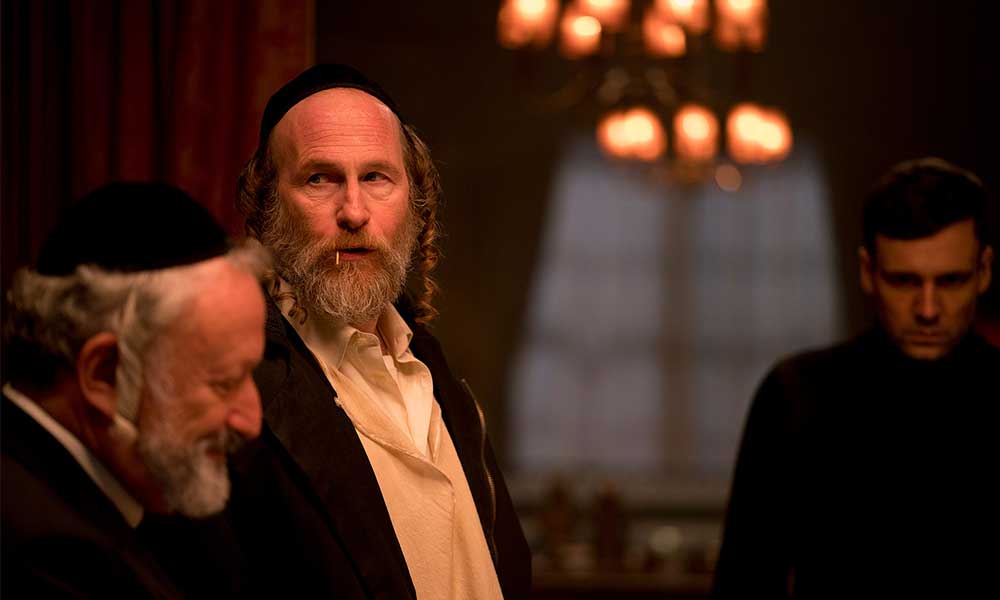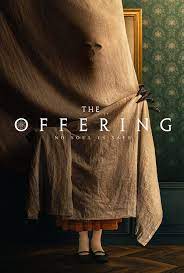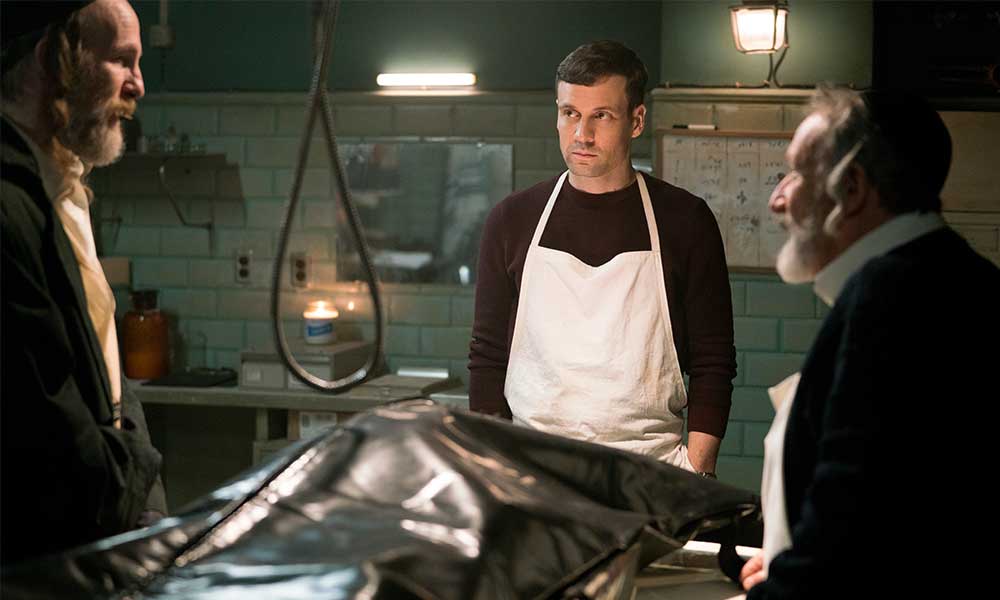Jewish Film Review | The Offering


Poster of the 2023 film “The Offering”, directed by Oliver Park. (Photo credit: Decal Releasing)
The Offering
2023
93 minutes
Director: Oliver Park
Genre: Horror
Available for streaming on: Amazon Prime, Apple TV and YouTube
“Do you want to do a mitzvah?”
Saul Feinberg (Allan Corduner), the Hasidic owner of a funeral home in the heart of Brooklyn, asks his irreligious son Arthur (Nick Blood) to assist in the preparation of a dead body. The deceased is an older man named Yossile (Anton Trendafilov), who died sealing a demon in his own body. Unbeknownst to the Feinbergs, the evil spirit is about to be set free.
The Offering, a horror movie directed by Oliver Park, is inspired by the ancient demon in Jewish folklore known as “the taker of children.” Called Abyzou, this demon is infamous for causing miscarriages, snuffing out the lives of infants and seeking sacrifices of young children. While Saul welcomes his only son Arthur and his non-Jewish wife Claire back into his home after refusing to attend their wedding, the situation turns grave when the demon escapes from Yossile’s body in the basement morgue and begins to target the Feinberg household. More specifically, the demon is after Claire, who is heavy with child, and it will stop at nothing until it gets what it wants.

Saul and his son Arthur preparing a dead body in Saul’s funeral home. (Photo credit: Decal Releasing)
The demon preys on the fears of its victims, forcing them to see and feel things that are not real. The lights in the funeral home flicker and go out, the hallways are filled with the murmur of indistinguishable voices, apparitions appear. Abyzou shapeshifts for each of its victims, luring them into doing its morbid bidding, feeding on their trauma with an insatiable hunger.
For the observant Jewish viewer, The Offering delivers an added layer of nuance concealed in an otherwise commercial horror movie. After lighting the Sabbath candles in front of a framed photograph of his late wife, Saul explains to Claire that men sing to their wives every Friday night, lauding the women for their inner beauty. “We’re a very misunderstood people,” he says. “It’s the burden of investing so much in internal meaning. It’s hard for outsiders to see.”
Saul’s statement is more than a reference to the often-misconstrued portrayal of Hasidim in contemporary media. The film is replete with pregnant allusions founded on the kabbalistic premises that guide Hasidic life and place importance on the inner depths of our worldly realm. It is no coincidence that the Feinberg family sits down to eat kreplach—dumplings traditionally eaten before Yom Kippur as a meditation on our outer and inner selves before our fates are sealed. In another pivotal scene, a dark shadow sweeps the hallway, and the mezuzah on the doorpost breaks violently in half—a signal that the holy parchment enclosed in the wooden case has been compromised and the spiritual protection over the house has disappeared.
Many of the frightening instances in the film rely on eerie visions reflected in the multiple mirrors filling the Feinberg home—moments that continue even after the mirrors are covered with cloth, as is customary during the mourning period. Of course, the sacrifice Abyzou wants most is securely under wraps: the unborn child hidden in Claire’s womb.
The Bible recounts that the ancient Israelites were guilty of straying after idols and sacrificing their children to demons, and the film leans into the story of Akeidat Yitzchak (Binding of Isaac) to explore the motivations that drive people to commit tragic acts of sacrifice or suicide. In the movie, the scribe Chayim (Daniel Ben Zenou) is shown penning the Torah portion related to Abraham and Isaac while a lecture called “Reflections & Concealments” by a fictional Rabbi Yitzchak Akida (a twist on Akeidat Yitzchak) plays on a cassette deck in the background. The image of a ram-horned demon might be overused in horror movies, but Abyzou’s most terrifying transformation is yet another nod to the origin story of sacrifice. Abraham may have been able to slaughter a ram instead of his beloved son Isaac, but the characters in The Offering might not be so lucky.
The rituals in The Offering include spells and sigils, chickens and ashes, holy letters and pendants, alluding to mystical instructions in various Talmudic and Kabbalistic texts. Much of the Jewish knowledge infused in the film is credited to writer and producer Hank Hoffman, who spent two years living in the city of Tzfat in northern Israel—renowned for its kabbalists—with only the clothes on his back, meditating and studying the works of the Breslov and Lubavitch Hasidic rebbes. “I went as close as possible to feeling authentic,” Hoffman says, referring to the rituals featured in the film. While the spell Yossile invokes to summon the demon is real, Hoffman changed a few words. “It has to remain secret,” he says. “In the end, I had to subvert a few accuracies for the sake of not messing with kochot (powers) that are above my pay grade.”
The blending of the genre of horror and the culture of Hasidism necessitates compromise. For a horror movie to work, characters often need to be isolated. But in Judaism, especially within the Hasidic community—for better and for worse—one is never alone. An early scene in the movie shows just how intertwined the lives of Hasidim are; children are laughing and playing in the street crowded with schmoozing men and women with double strollers. Even a dead body is guarded overnight by a designated shomer. Arthur, who has left the fold of his close-knit community, embodies that compromise—and when he tears the tefillin from his body and breaks away from the shiva guests, intent on being alone, he and his hapless wife become easier prey for Abyzou.
There are small inconsistencies in The Offering visible to the keen eye. The sequence of laying tefillin and shirt rending might befuddle experts in the laws of Jewish mourning. There are too many pieces of jarred gefilte fish laid out on the Sabbath table for three people to plausibly consume, and when Saul recites the prayer for the dead, his prayerbook is incorrectly opened to the morning services of the Sabbath. But the attention to authenticity is otherwise impressive. While Claire and Arthur are using the latest smartphones, the Hasidim around them are still using tape recorders, VCRs, VHSs, corded telephones, and cassette players—in line with the commitment to abstain from the temptations easily available in the modern world. The outdated technology—with its clumsy hardware and fuzzy static interference—has the providential effect of making the film even creepier.
The theological questions underpinning The Offering are most fully explored in the relationship between father and son. Saul is a deeply religious and spiritual man, grieved by the loss of his wife and the intermarriage of his son. He dies with the Shema—the prayer proclaiming God’s oneness—on his lips. Arthur, on the other hand, insists that prayer does nothing and that God is heartless. After all, as a young boy, he prayed for the health of his ill mother to no avail.
In the end, Arthur returns to everything he ran away from as a last resort. Hoping to save his wife and unborn child from the grasp of Abyzou, he opens up his father’s prayerbook. When Abyzou’s interference liquifies the Hebrew letters and causes black ink to run down the pages, Arthur is forced to turn away from the text. The prayers he memorized as a child rise unbidden to his lips, and he cries out the famous verse from Psalm 23: “Even when I walk in the valley of the shadow of death, I will fear no evil for You are with me; Your rod and Your staff—they comfort me.”
Access Moment’s Moment’s Film and Movie Reviews.
Chaya Sara Oppenheim currently serves as editor of The Shekel, the academic journal of the American Israel Numismatic Association.
Top image: Actor Allan Corduner playing Saul Feinberg in the 2023 film “The Offering”.
